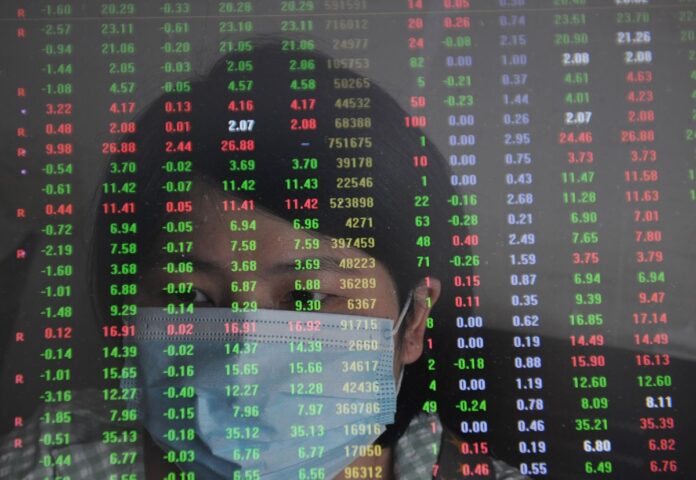After Fiona Hu left her small rural hometown at 18 years old, she put in decades of hard work to start her own beauty salon in Guangzhou.
But after two years of on-again, off-again business due to the coronavirus pandemic, she is drowning in debt and her dream is turning into a nightmare.
“Now, I have nothing but loans,” the 44 year old said.
Slowing economic growth, driven by China’s zero-Covid strategy – which relies on lockdowns and mass testing to stamp out local Omicron outbreaks – has put unbearable strain on her finances.
Hu and her husband had been struggling to cover their bills over the past year, but by May, they could no longer make monthly mortgage payments of 9,000 yuan (US$1,341). Their flat is set to be seized and auctioned.
“I don’t think I can get out of debt in my lifetime. Everybody is struggling – life is very difficult,” said Hu, who owes more than 2 million yuan on top of the mortgage.
Rising debts and falling incomes are not just an issue for small business owners in China, who have been hit particularly hard by stagnating economic growth in recent months.
It’s a similar story for Tang Ying, a 36-year-old secretary with a small technology company in Guangzhou.
Tang has managed to hold onto her job, but her monthly pay has been slashed from about 5,000 yuan to about 4,000 yua
Faced with the uncertain economic outlook, Chinese households are cutting back on spending.
New household loans in the first five months of the year totalled 1.33 trillion yuan, the lowest level in a decade, according to Shen Jianguang, chief economist at JD Digits, the fintech arm of e-commerce giant JD.com.
Short-term household loans were 192.7 billion yuan, at their lowest point for the January-May period since 2009, reflecting weak domestic consumption.
Medium- and long-term loans were also at a six-year low of 1.14 trillion yuan in the first five months, indicating sluggish demand for property purchases, Shen said.
“There is a trend of shrinking balance sheets in China’s household sector and the experience of developed economies tells us that once households start to shrink their balance sheets, the impact on economic growth is persistent and severe,” he said.
n. Tang’s mother, who is retired, had to use all her savings to help her repay 110,000 yuan of consumer and credit card loans recently.
Their stories reflect a growing sense of unease among China’s middle class. Two years of sustained economic uncertainty has shattered the idea that growth and rising disposable incomes – provided you work hard – are a given in the world’s No 2 economy.
Greater stimulus policies are needed to support incomes, employment and consumer spending, Shen said.
The operating conditions of micro- and small-sized enterprises (MSEs) continued to decline in the first three months of 2022, according to a quarterly survey by the Institute of Social Science Survey at Peking University and Ant Group Research Institute.
Compared with the same period last year, MSEs experienced an obvious decline in operating income, cash flow and profit margins, the report showed.
Some 38 per cent of MSEs had extremely tight cash flow, which would tide them over for less than a month, up from 30.0 per cent in the first quarter of 2021. Results are likely to worsen during the second quarter, when multiple major cities – including the commercial and financial hub Shanghai – were under lockdown.
Household income this year will grow at a slower pace than last year, given that the Chinese economy is facing mounting domestic and external headwinds from a new wave of coronavirus infections and consequent lockdowns, renewed supply chain disruptions and rising external uncertainties from the Russia-Ukraine war.
Average selling prices for residential property in China are also forecast to decline moderately in 2022 because developers will offer discounts to support sales and cash flow, according to a report by Moody’s Investors Service released in late April.
Homebuyers’ appetite for property purchases is subdued, despite the introduction of various measures to stimulate demand in recent months, the report said.
In the first five months of this year, the cumulative sales area of commercial properties nationwide declined 23.6 per cent year on year, with the rate of decline expanding significantly in April and May, while several local governments have introduced favourable policies to spur property transactions in recent months.
Many small business owners and middle-class Chinese have bleak expectations.
“What is missing now is confidence, the expectation that wages and the domestic economy will continue to rise,” said a Shenzhen civil servant surnamed Zheng, who did not want to identify himself.
He said wages in his department had dropped by about 30 per cent this year, which will put strain on his ability to meet mortgage payments on two properties that he bought with loans based on his family’s income back.
Local governments across the country are cutting back on a range of perks and bonuses as part of a drive to reduce costs.
Daisy Deng, a Guangzhou-based lawyer, said she was becoming cautious with spending and had dropped a plan to buy a new car due to the economic environment.
“People’s confidence in their income and ability to repay debt is changing rapidly,” she said.








































